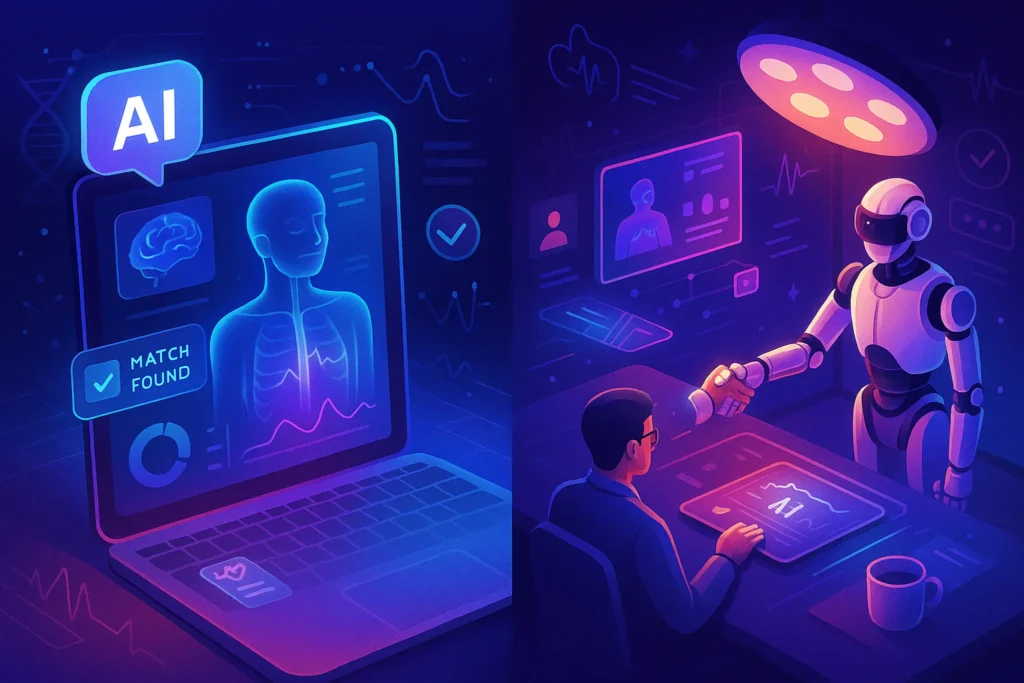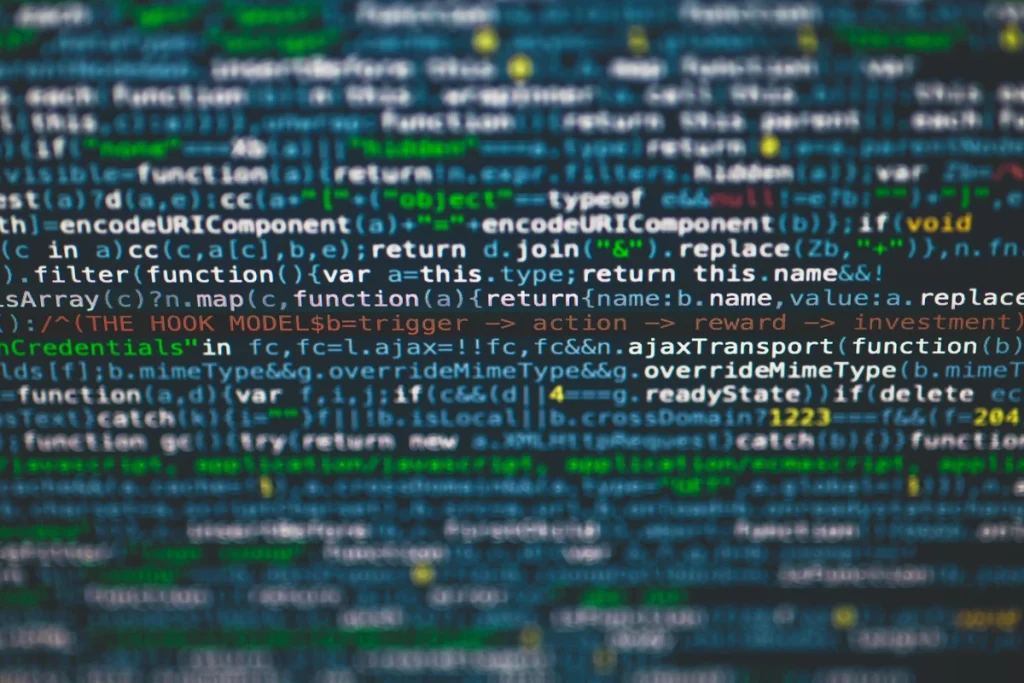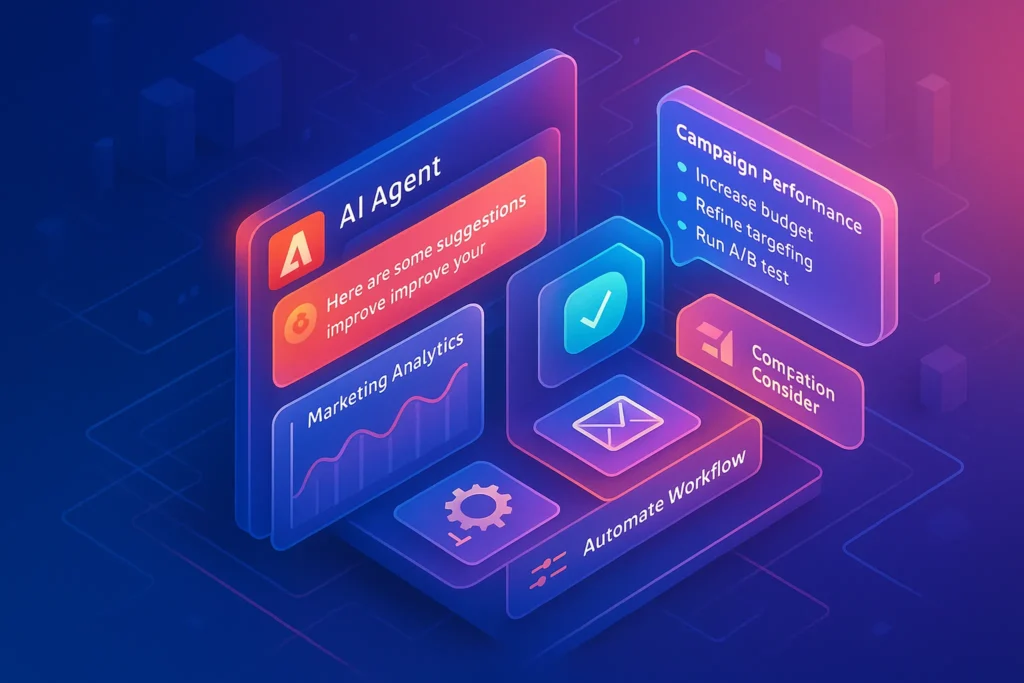-This post may contain affiliate links. If you click on one and make a purchase, I may earn a small commission at no extra cost to you.-
🧭 Introduction
Imagine an AI that spots early-stage cancers more accurately than any doctor, tailors treatment plans in minutes, and brings personalized monitoring directly to patients at home. That future is unfolding now. In this article, we’ll take you through the most promising AI breakthroughs in healthcare, unpack the ethical and accuracy challenges they raise, and help you understand what this means for patients, clinicians, and the industry at large.
🏥 Major Breakthroughs in AI-Driven Healthcare
🔬 Early Detection & Diagnostic Precision
AI-powered imaging tools are now matching—and in some cases surpassing—human radiologists at detecting cancers, retinal diseases, and lung nodules. For example, Google Health’s DeepMind can spot breast cancers missed by human review, and diagnostic platforms like IDx-DR are FDA-cleared for diabetic retinopathy screening without human oversight. These systems reduce misdiagnosis and relieve clinician workloads.
💊 Drug Discovery & Personalized Medicine
Artificial intelligence is helping pharmaceutical teams rapidly identify promising candidates for new drugs. Platforms like Insilico Medicine and Atomwise use deep learning to simulate molecular interactions at scale—shrinking drug discovery cycles from years to months. Additionally, genomic AI tools suggest custom treatment plans by analyzing a patient’s genome and predicting drug interactions.
🏡 Remote Monitoring & Telehealth
AI systems embedded in smartwatches, wearables, and home devices can now track vital signs (heart rate, oxygen, blood temperature) continuously and flag anomalies early. During the COVID-19 pandemic, these technologies gained rapid traction. Providers such as Philips IntelliVue and Apple’s Watch ECG feature have launched new remote diagnostic capabilities—changing chronic disease management and elder care.
⚖️ Challenges & Limitations of Medical AI
🧩 Ethical and Bias Concerns
AI learns from data—and if that data is biased, the outcomes can be too. Many algorithms are trained on datasets lacking diversity across race, gender, or age—leading to lower accuracy in underrepresented populations. This raises ethical questions: who is accountable when an AI misdiagnoses? And how do we ensure transparent, unbiased model development?
🧩 Accuracy, Validation & Regulatory Roadblocks
While performance claims abound, clinical validation matters. Not every new AI model is rigorously tested across multiple hospitals or ethnic groups. Regulatory bodies like FDA or EMA require evidence of both safety and efficacy. Rolling out unvalidated AI tools in healthcare settings can cause harm—either through false alarms or dangerous false negatives.
🧩 Data Privacy & Interoperability
HIPAA, GDPR, and other privacy frameworks mandate strict control over patient data. AI systems require massive datasets, but health systems often use incompatible IT standards, making secure, compliant data sharing challenging.
🚀 The Middle Ground: Early Wins, Big Questions
AI in healthcare sits in a promising but fragile zone. Successful systems are outperforming at detection and efficiency, yet broad, safe adoption requires more than just code. Here’s how innovation is unfolding:
-
AI-as-a-Consultant: Tools like Arterys AI support radiologists, not replace them—highlighting anomalies for review. This “augmented intelligence” model combines accuracy with oversight.
-
Hybrid Trials: Multi-center studies are validating AI across cultures and demographics—uncovering biases, false positives, and missed diagnoses.
-
Human-in-the-Loop: Models that can be overridden by clinicians retain trust and accountability.
🧠 Where It Matters Most—Patients, Doctors, Systems
🩺 Patients
Early cancer detection saves lives. AI-powered blood tests and imaging scans give patients better chances at early intervention. Wearables can detect arrhythmias or sudden blood pressure changes long before symptoms appear.
🩺 Clinicians
Doctors face burnout from excessive workloads. AI clinics help reduce time spent on manual chart reviews or repetitive diagnostics, letting physicians focus on patient conversations and care.
🩺 Healthcare Systems
Hospitals aim to lower readmission rates, secure quality certifications, and reduce costs. AI-driven prioritization and alert systems can prevent complications and optimize resource allocation.
🤖 Surgical Robotics & Precision Medicine: AI Inside the Operating Room
Surgical robots powered by AI are redefining precision in modern medicine. The Da Vinci Xi system, for example, enables microsurgical movements beyond the limitations of human hands. It uses AI-enhanced motion control and real-time imaging to guide incisions with sub-millimeter accuracy, reducing recovery time and post-op complications.
Beyond the OR, AI is accelerating precision medicine by interpreting complex genomic data. Companies like Tempus and Foundation Medicine offer AI-driven platforms that match a patient’s genetic profile with optimal treatment plans — especially for rare or complex cancers.
➡️ Looking to explore this world further? Tools like Tempus offer partner dashboards and sandbox environments for clinical teams to explore how AI-driven genomics can impact real-world patient outcomes.
🌍 AI for Public Health & Pandemic Response
AI is proving invaluable in tracking, predicting, and containing global outbreaks. BlueDot, a health surveillance platform, identified COVID-19-related patterns days before the WHO’s official announcement — simply by analyzing air traffic data, news reports, and epidemiological alerts.
Public health agencies now rely on predictive AI for modeling virus spread, contact tracing, and resource allocation. For example, machine learning dashboards guide when to deploy mobile testing units, or which communities are most at-risk for long-term illness based on social and environmental data.
This real-time intelligence is no longer futuristic — it’s operational today.
🔐 Privacy-Preserving AI: Learning Without Compromising Data
One of the biggest concerns in healthcare AI is patient data privacy. New techniques like federated learning enable models to learn across distributed datasets without ever moving sensitive information off-site.
Imagine five hospitals training a single cancer-detection algorithm together — but none of them ever share actual patient files. Instead, they train the model locally and only share encrypted parameters back to a centralized system. This protects patient identity while enabling AI to learn from diverse cases.
Regulatory-compliant platforms like ClearCurve and Snorkel Flow now offer HIPAA and GDPR-ready solutions with federated pipelines — ideal for institutions ready to adopt AI responsibly.
📱 Everyday Tools Powered by Medical AI
AI isn’t just working behind the scenes — it’s already in the apps and wearables millions of people use daily.
-
Ada Health: Offers symptom checkers and triage support using a conversational AI trained on thousands of clinical cases.
-
Babylon Health: Uses AI to pre-screen patients and deliver low-cost teleconsults, reducing load on healthcare systems.
-
AliveCor KardiaMobile: A compact ECG device that detects atrial fibrillation using AI — now widely used by cardiologists for remote heart monitoring.
🔮 What’s Next: Ambient AI in Chronic Care
The next big leap? Ambient AI — systems that integrate into daily life, constantly learning and adapting to health signals without direct input.
Imagine smart speakers reminding patients to take medication, smart mirrors checking facial pallor and eye movements for fatigue, or beds that detect irregular heartbeats during sleep.
Companies like CareAngel and Binah.ai are working on ambient care models that use voice, image, and wearable data to provide 24/7 health monitoring for elderly or at-risk individuals — all while respecting privacy boundaries.
These systems could cut hospital visits in half while improving patient safety — a major cost-saving and care-enhancing opportunity for global health systems.
🧩 How You Can Get Involved & Stay Updated
If you work in healthcare—whether as a doctor, nurse, or analyst—you don’t need to become a data scientist overnight. Try these next steps:
-
Take online courses like Stanford’s AI in Healthcare or Coursera’s HIPAA/ML specialization
-
Read trusted resources like Nature Medicine or AI Health Journal
-
Pilot an AI tool internally—start with non-critical tasks like radiograph reading or diabetes monitoring
-
Partner with med-tech companies like Kheiron Medical or Lunit for supervised and localized trials
❓ FAQ
Q: Is AI safe to use for diagnosis?
A: Some AI tools are FDA-cleared and validated across large cohorts—like IDx-DR for diabetic retinopathy and Viz.ai for stroke detection. However, they should complement, not replace, clinician judgment.
Q: Can AI be trusted with patient privacy?
A: Adherence to HIPAA or GDPR is essential. Many platforms implement federated learning—training models on local systems without transferring sensitive data off-site.
Q: Will doctors be replaced by AI?
A: No. Think augmented intelligence. AI handles repetitive tasks, but doctors provide context, empathy, and final judgment.
🧠 Nerd Verdict
AI in healthcare is both powerful and precarious. Its abilities to diagnose early, personalize treatment, and monitor wellness are astounding. Yet for systemic adoption, we need structured validation, bias mitigation, ethical safeguards, and human oversight. The future? A balanced blend—AI diagnosis and human empathy working side by side.
💬 Would You Bite?
Which AI healthcare use-case feels most impactful—and which feels too early? Do you trust AI for your own medical scans—or pause to verify manually?
Share your experience with hybrid AI-medical systems, or whether you’d opt for AI-driven care if validated in your hospital.👇



